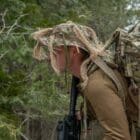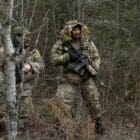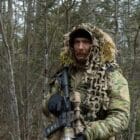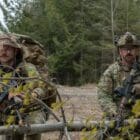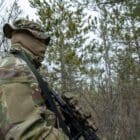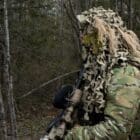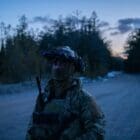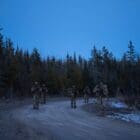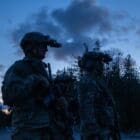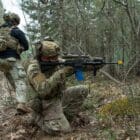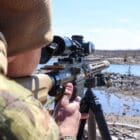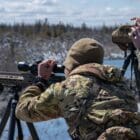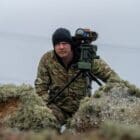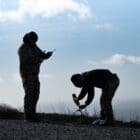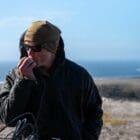Archive for the ‘AFSW’ Category
Saturday Night Feature: Special Operations Weatherman Documentary 1968 (USAF SOWT)
Sunday, July 6th, 2025US, Sweden Partner for CSAR Training
Saturday, July 5th, 2025LULEA, Sweden (AFNS) —
In the challenging terrain of northern Sweden, the 57th Rescue Squadron based out of Aviano, Italy and Swedish air force rangers based out of Ronneby, Sweden, collaborated to accomplish high-stakes personnel recovery training from March 30 through June 14. What began as planned participation in the Arctic Challenge Exercise transformed into a focused bilateral mission in one of Europe’s most strategically vital regions.
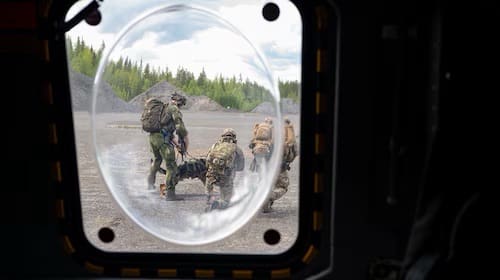
“This exercise focuses on traditional personnel recovery—retrieving simulated downed pilots or isolated personnel from contested areas and safely reintegrating them into friendly forces,” explained U.S. Air Force Staff Sgt. Drew Guerra, 57th RQS Tactical Air Control Party joint terminal attack controller.
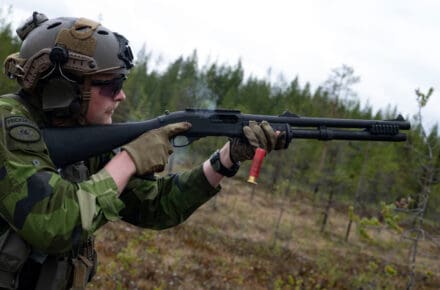
The 57th RQS sent a small, specialized team composed of TACP, intelligence, communications and survival, evasion, resistance and escape specialists to integrate with the Swedish air force rangers. Together, they executed live, full-mission profiles to develop and test tactics, techniques and procedures for the ever-evolving battlefield in Unmanned Aircraft Systems, counter-UAS and infiltration methods for traditional and non-traditional personnel recovery.
“We like to have [the 57th RQS] join us on as many occasions as possible, and vice versa,” said Master Sgt. Rasmus Antonsson, Swedish air force ranger troop chief. “We aim to train and compete with the best, and to us, that is the U.S. Air Force.”
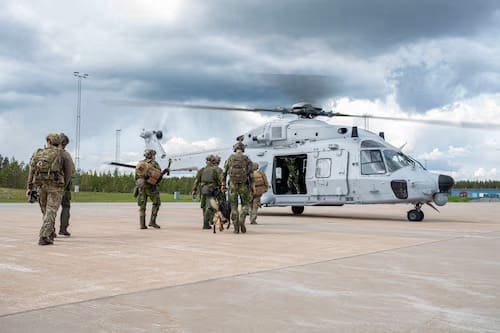
The unforgiving northern terrain of swamps, hills and dense woods presents unique operational challenges. Helicopter teams must adapt to limited landing zones while ground crews navigate harsh conditions to move patients swiftly and safely.
For the 57th RQS, this environment is unfamiliar and the experience is invaluable. Training in Sweden offers critical exposure to the operational demands of northern Europe and deepens integration with Swedish partners.
“We have a great history of integration with Sweden and are always grateful for the opportunity to work with our northern allies,” said U.S. Air Force Tech. Sgt. Matthew Doyle, 57th RQS SERE specialist. “Their constant professionalism and willingness to exchange lessons learned is a testament to our seamless partnership.”
Located near the Arctic Circle, northern Sweden offers a critical staging ground for allied operations. In the event of conflict, pre-positioned aircraft and recovery forces in the region could launch missions across the Baltic Sea faster and with greater cohesion. Thanks to this training, U.S. and Swedish teams are laying the groundwork for an integrated, ready and resilient task force in the High North.
By SSgt Brooke Rogers, 31st Fighter Wing Public Affairs
Vintage Combat Control Team Action
Sunday, June 22nd, 2025
Special Tactics Enterprise Transitions as 24 SOW Flag Furled
Friday, May 30th, 2025HURLBURT FIELD, Fla. —
The 24th Special Operations Wing furled its flag May 16, 2025, marking the transition of the organizational structure of the Special Tactics enterprise, the latest change in Air Force Special Operations Command’s commitment to adapting to the evolving demands of the strategic environment.
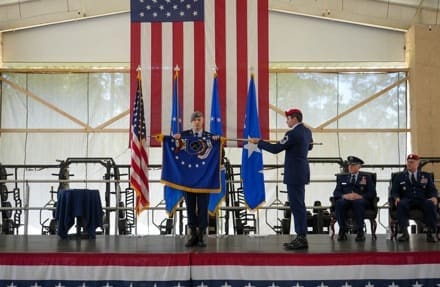
“The furling of this flag represents not an end, but another transition point for both the Special Tactics community and AFSOC,” said Lt. Gen. Michael Conley, commander Air Force Special Operations Command. “I truly believe that the best days of Special Tactics lie ahead, not behind us. Special Tactics remains vital to AFSOC and our Nation.”
Activated in 2012 as the ST functional wing, the 24 SOW was initially designed to maximize the effectiveness and advocacy of AFSOC’s air-to-ground integration force. However, the operational environment has evolved significantly over the past 13 years, impacting the role of ST within AFSOC.
“The 24th Special Operations Wing has not ended. It has simply passed into each of you. Wherever you go next, carry it forward. Lead with the quiet strength that built this wing. Fight with the heart that made it great. Honor those who cannot stand beside us today,” said Col. Dan Magruder, outgoing 24 SOW commander.
While the demand for small, self-sustaining, and distributed forces – the attributes inherent to ST units – are more valuable than ever, the integration of ST into the larger AFSOC enterprise has matured considerably. ST leaders, both officer and enlisted, now consistently fill key leadership positions across the command, SOF enterprise and joint force.
“This isn’t a division of labor. This is a unity of effort as we transition to the next phase,” said Col Joseph Gross, 720th Special Tactics Group commander. “I can’t wait to see the next two years as we move out with a new [organization],” he added.
The 720 STG will now report directly to AFSOC headquarters continuing to provide operational and administrative oversite of the 2-series special tactics squadrons, as well as the Special Tactics Training Squadron which is responsible for combat mission qualification for all ST operators.
“The evolving strategic landscape and advancing adversary capabilities underscore the invaluable nature of Special Tactics’ skills,” said Conley. “Innovation, ingenuity, boldness, and valor have been defining attributes of the ST community since its inception and are critical as AFSOC adapts to meet the challenges ahead.”
By AFSOC Public Affairs
AFSOC Public Affairs
TACP, SERE Airmen Conduct Sensing Operations Against 820 BDG Opposing Forces at Exercise Capri Sun
Wednesday, May 28th, 2025ALPENA, MICHIGAN, UNITED STATES
U.S. Air Force Survival, Evasion, Resistance, and Escape (SERE) specialists and 3d Air Support Operations Group (ASOG) Tactical Air Control Party (TACP) waged simulated war against 820th Base Defense Group (BDG) Airmen during exercise Capri Sun at an Alpena Combat Readiness Training Center operations site in Michigan, Mar. 31 to Apr. 11, 2025.
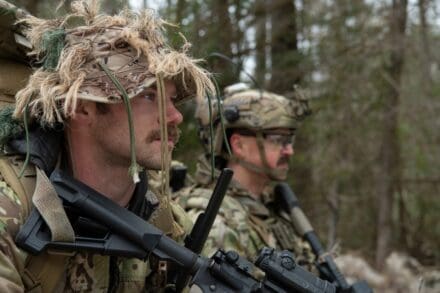
Blue force TACP and SERE conducted surveillance and targeting operations while being hunted by 820 BDG opposing forces in the bitter cold of Michigan’s forests reaching lows of 14 degrees Fahrenheit. The opposing forces’ goal was to detect TACP and SERE Airmen’s presence with small unmanned aerial systems, simulated intelligence injects, roving patrols, and reconnaissance and surveillance equipment, then to engage with blank rounds and simulated indirect fire.
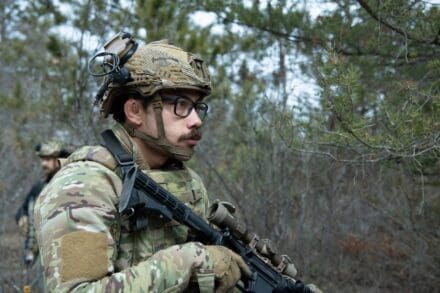
820 BDG’s primary mission is to defend austere airfields in contested battlefield environments, and this exercise enabled them to apply their defensive fundamentals to protect simulated adversarial assets on this battlefield. Blue forces aimed to infiltrate these defenses undetected to provide targeting data to strike assets.
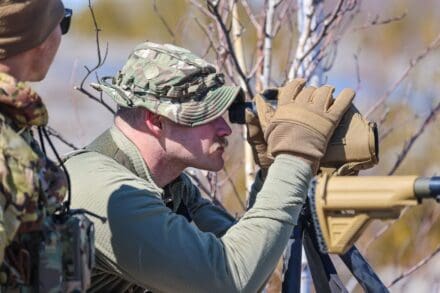
These opposing forces stressed the TACP and SERE Airmen’s ability to blend into the environment, move covertly throughout the simulated battlefield and detect critical assets for strikes. The weather, environment and opposing forces confronted these blue forces during their 108 operating hours.
These blue forces enabled 820 BDG opposing forces to develop and test their subordinate leaders, the backbone of a flexible fighting force. Through centralized planning and decentralized execution, these subordinate leaders executed individual operations to achieve their common objective.
“The capability for a commander to empower their subordinate leaders to execute their intent with minimal oversight is a huge force multiplier in Agile Combat Employment operations,” Pyle explained. “Rather than operating as one giant echelon of troops at a company level, we can execute multiple missions at the squad level and below to achieve greater effects.”
Story by Capt Christian Little
93rd Air Ground Operations Wing
Retired Combat Controller Gifted His ‘Forever Home’
Sunday, May 4th, 2025CRESTVIEW, Fla. —
“Everybody in a beret back there… that is the only reason these entire experiences from seven years ago to now has been tolerable.”

U.S. Air Force Staff Sgt. Justin Day reflected on his healing journey during a home-gifting ceremony on April 16 in Crestview, Florida where he and his family received a forever mortgage free home.
Day, a medically retired 6-year Air Force Special Tactics veteran and Purple Heart recipient, was deployed to Afghanistan in July 2018 when he stepped on a pressure plate initiated IED while conducting compound clearances. He was launched into the air and landed on his back. He lost his right foot, sustained severe hand injuries, and the lower half of his leg was stripped of all soft tissue.
As Day recovered from his injuries, he decided he wanted to call Crestview home with his two sons and Wednesday marked fruition of that decision.
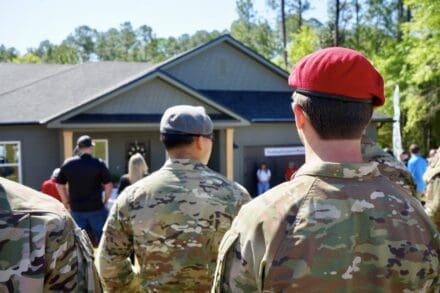
A crowd of Airmen assigned to the 24th Special Operations Wing and cheering supporters, community members, and volunteers waved American flags to greet Day and his family when they arrived at their new home. The patriotic procession escorting them included the Crestview Police Department, North Okaloosa Fire and Sheriff’s Departments, and Patriot Guard Riders.
“Nobody here had to do any of this, but you did,” said Day. “That’s why any of this life experience is palatable and worth it. Thank you specifically to the guys back there in berets, this community is amazing.”
The four-bedroom 1,800 square-foot home sits on land donated by retired U.S. Air Force Master Sgt. Charles Hughes and his wife, Ellen.
“This is a gift to my family and their future, more than it is for me,” said Day. “My two [sons] don’t know it yet, but this is a pivotal moment in their lives.”
The home was built by Building Homes for Heroes, a non-profit organization committed to rebuilding lives and supporting injured Veterans.
By Capt Savannah Stephens, 24th Special Operations Wing
TACP Conduct Target Acquisition, Distributed C2 Operations During Exercise Bamboo Eagle 25-1
Saturday, February 22nd, 2025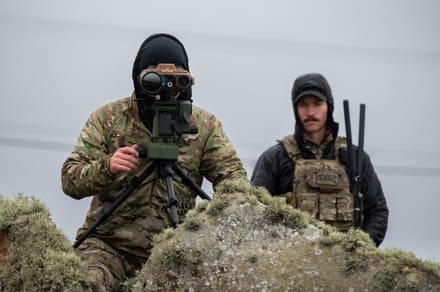
MOODY AIR FORCE BASE, Ga. (AFNS) —
U.S. Air Force Special Warfare Tactical Air Control Party teams from the 93d Air Ground Operations Wing enabled critical Command and Control (C2) and sensing capabilities for exercise Bamboo Eagle 25-1 across America and islands in the Pacific Ocean, Feb. 10-14.
The employment of Integrated Sensing and Effects Teams (ISET), Lead C2 teams, Distributed C2 teams, and Mission Command provided a robust and resilient employment model playing a critical role in the exercise. TACP facilitated real-time data passage critical to feeding and closing long range kill chains achieving kinetic and non-kinetic effects, which are essential in future operations.
“TACP’s C2 expertise was invaluable to the success of this exercise,” said Lt. Col. Alex Rich, BE 25-1 exercise manager. “They supported mission accomplishment and provided capabilities we need in future operations.”
Around 60 TACP and Special Warfare Mission Support Airmen employed diverse waveforms from numerous distributed operating locations to ensure C2 resiliency in an exercise designed to stress Airmen and their equipment in an advanced, non-permissive and modern battlefield environment. The exercise emphasized real-time planning and execution, requiring AFSPECWAR Airmen to be agile and creative in their application of target acquisition and distributed C2 capabilities.
“The character of warfare has changed requiring TACP to evolve and solve joint and coalition force problems. We are more than cleared-hot, yet our roots in that role have uniquely enabled us to operate at the tactical edge, survive, and more importantly connect the joint force to not only employ effects at the right place and time, but give our leaders decision advantage,” said Lt. Col. Ralph Johnson, 19th Air Support Operations Squadron commander. “I cannot be more proud of my team, they’ve committed completely to the process of getting better daily in the lead up to these exercises and it has shown.”
Contingencies and adversarial capabilities provide simulated enemies a vote in combat-replicative exercises like BE 25-1 which highlights a need for C2 resilience and diverse methods for mission accomplishment. C2 employment in the Air Force’s Agile Combat Employment scheme of maneuver creates unique challenges that require a flexible and adaptive force structure and Airman.
“TACP are comfortable with ambiguity and adapting to unique and complex scenarios, it’s what we’ve been doing since our inception,” Maj. Zachary Van Cleef, 19th ASOS Assistant Operations TACP officer explained. “As top tier integrators and force multipliers, TACP will prove to be an essential asset in any future conflict.”
As these complex C2 challenges continue to evolve, so do Joint Force solutions to these problems.
“Our team prepared for this exercise along with RED FLAG-Nellis for over six months,” Van Cleef said. “They filled both a C2 and real-time forward edge targeting gap that proved pivotal to the success in BE 25-1. At the squadron, our team culture and commitment enable us to stay ready and yield high-level results wherever, whenever.”
By Capt Christian Little, 93rd Air Ground Operations Wing
WEPTAC AFSPECWAR Industry Show This Week at Nellis AFB
Monday, January 13th, 2025WEPtAC attendees be sure to visit with these great companies supporting Air Force Special Warfare.

Thanks to PK Gunsmithing for the graphic!


